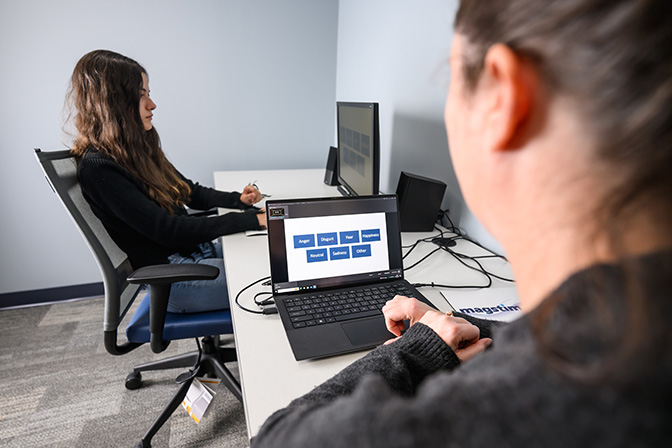Psychology professors Dr. Ian Norris (left) and Dr. Alison Heck (right) help prepare Claudia Read ’24 for experiencing new capabilities within Berea’s recently upgraded psychology lab. Photo by Crystal Wylie ʼ05
Psychology in the 21st Century
The basement of the Frost Building has recently undergone a dramatic transformation. What had been a maze of dark hallways and isolated testing rooms has become an inviting, open area filled with natural light, designed to support both teaching and collaborative research.
Dr. Ian Norris, marketing professor, director of the Entrepreneurship for the Public Good (EPG) program and former chair of the Psychology Department, spearheaded the renovation that brought the basement space into the modern era.
“Back in the 1990s, the space reflected the research methods of the time—mostly paper-based studies,” Norris explains. “Participants would be placed in small, individual rooms to complete tasks. Today, research looks very different.”
Advances in technology have shifted psychological research toward digital platforms like Qualtrics, enabling researchers to gather data from broader, more diverse populations. Recognizing this shift, Berea’s administration decided it was time to renovate the old basement, making it more consistent with current research practices.

The new design focuses on openness and collaboration, converting isolated rooms into multifunctional spaces where students and faculty can work together.
“We restored windows that had been covered for decades, letting light flood in,” Norris said. “Now, students can gather in comfortable seating areas overlooking the quad, transforming the space into a place they want to be.”
With state-of-the-art tools like a new electroencephalogram (EEG) system and upgraded labs, the department is now equipped to offer cutting-edge research experiences. Norris also ensured that pieces of the department’s history remained intact. “We found old equipment like reaction timers and even World War II-era psychological tests,” he noted. “These artifacts will be displayed in seminar rooms to honor the department’s legacy.”
Amid these changes, Dr. Alison Heck, assistant professor of psychology, has been leveraging the renovated space to push the boundaries of student learning. Since joining Berea, Heck has focused on hands-on research, particularly in the field of developmental psychology. “I’ve been really excited to see how the new spaces have energized both the students and faculty,” Heck said. “We now have the resources to offer more experiential learning.”
Every student completes a capstone project. They design an experiment from start to finish, gaining skills that set them apart when applying to graduate schools.
Dr. Alison Heck
Heck, a developmental psychologist, has made it her mission to equip students with practical research skills. She emphasizes the importance of independent study, a cornerstone of Berea’s psychology program. “Every student completes a capstone project,” she explained. “They design an experiment from start to finish, gaining skills that set them apart when applying to graduate schools.”
Heck’s research focuses on how people perceive emotions across different backgrounds, using tools like eye-tracking technology to gain insights. “I’m interested in how our backgrounds affect how we recognize and express emotions,” Heck says. “We know people generally struggle to recognize emotions in faces from other races, a phenomenon known as the ‘other-race effect.’ My work aims to understand why that happens.”
The new lab space has proven instrumental in advancing Heck’s research. “We’ve been able to create a more inclusive database for emotional faces, using models from a variety of racial and cultural backgrounds,” she explains. “That’s something existing databases often lack.” Her portable eye tracker allows her to conduct studies with participants of all ages, including infants, opening new avenues for student-led research projects.
Beyond her own research, Heck mentors students through Berea’s Undergraduate Research and Creative Projects Program (URCPP). “Last summer, I worked with five students on research projects,” she said. “The renovated space has made these collaborations much smoother and more engaging for everyone involved.”
As the department continues to expand with new faculty and cutting-edge resources, Heck sees endless potential for her students. “Psychology isn’t just about therapy,” she emphasized. “I want students to see the diverse career paths available in research, academia and industry. Offering them access to tools like eye trackers and EEG systems gives them an edge against graduates from much larger schools.”
Both Heck and Norris share a vision for the future of Berea’s Psychology Department: One where students not only learn the theory but also apply it in meaningful, hands-on ways.
“The renovations have brought the department into a new era,” Heck said. “It’s an exciting time to be here, helping our students unlock their full potential.”
Heck is joined by Dr. Rebecca Singer, who will lead efforts to increase student involvement in behavioral neuroscience, and Dr. Sarah Jones, the new department chair, who believes the lab, collaborative spaces and updated classrooms will continue to enhance the student experience in psychology.


